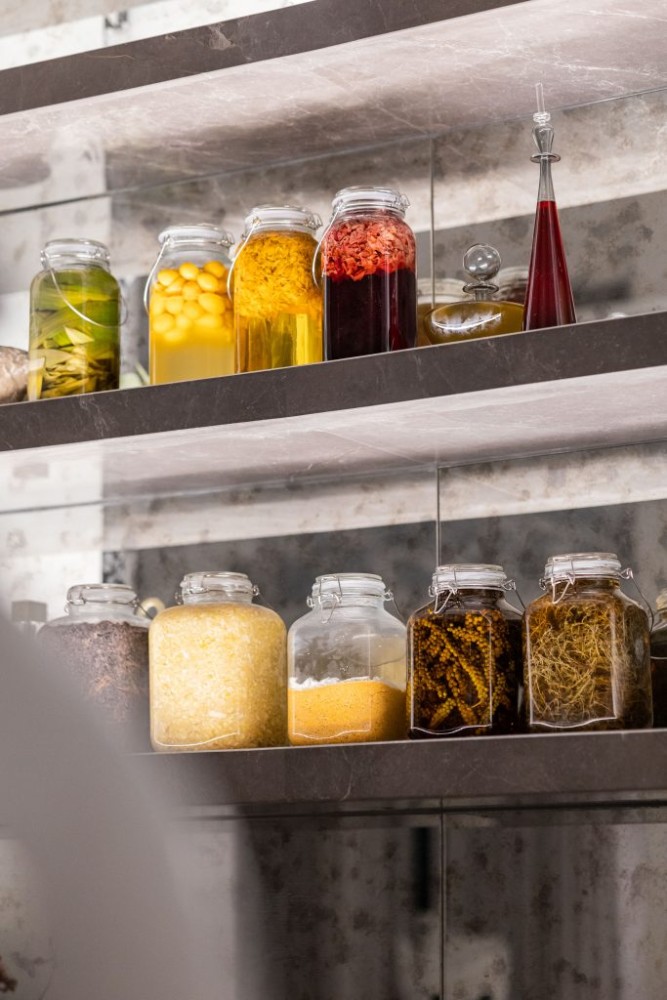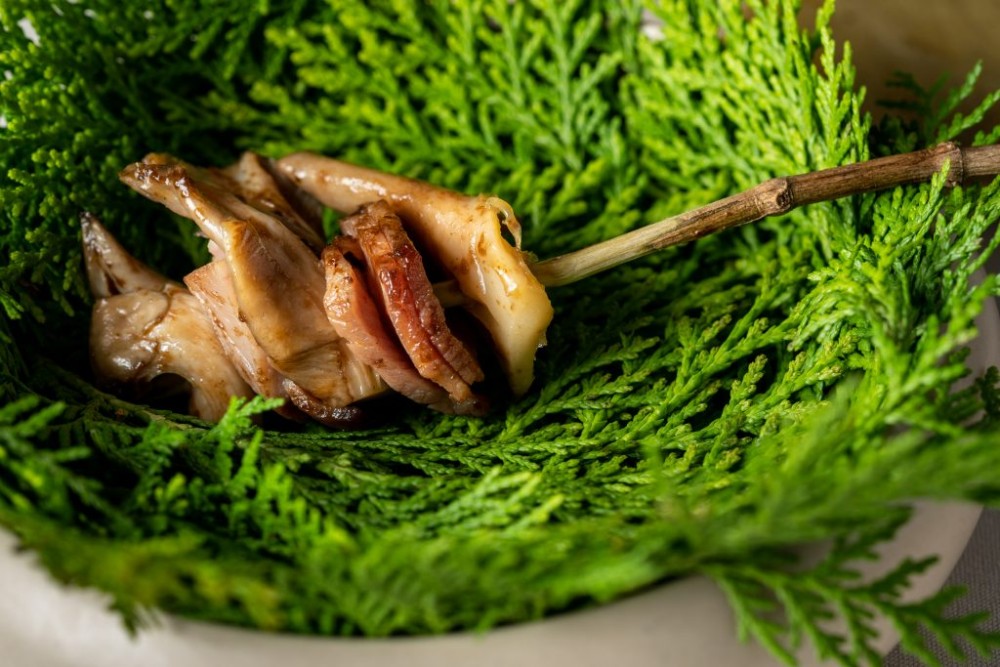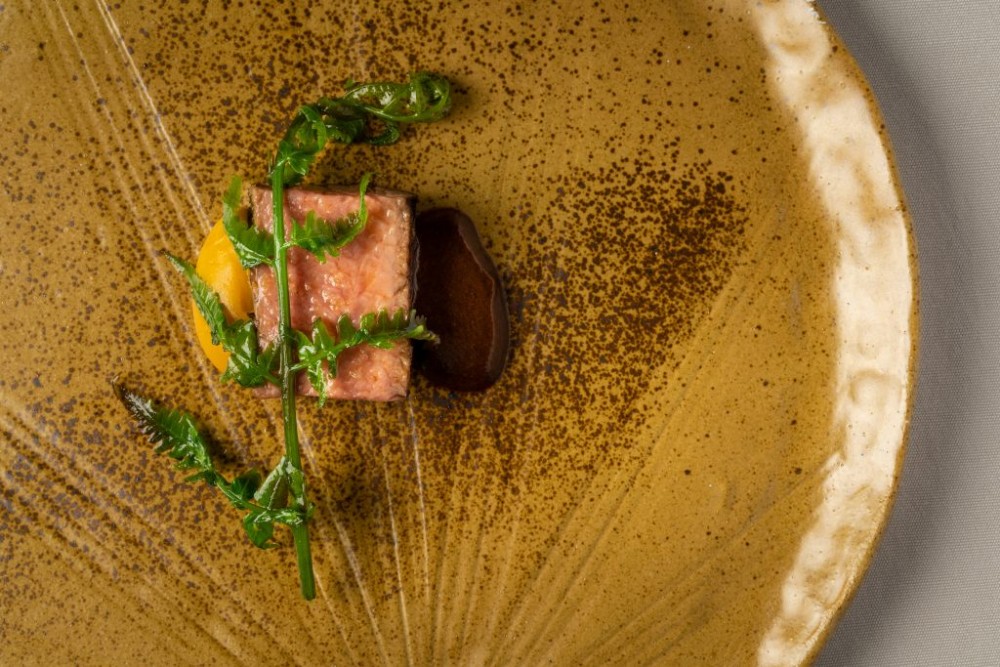Hom brings out the fun in fermentation
Jun 30, 2023
There’s no harm in letting a little bacteria bloom. At least not in the fermentation-centric kitchen of Hom, led by Ricardo Nunes. The Portuguese-born chef talks to Stephenie Gee about discovery and exploration via this ancestral foodway

Back when the coronavirus marooned us all at home, many of us sought ways to keep sane and productive. Some set out on becoming a master chef; some spiralled down the dark – but delightful – rabbit hole of TikTok dances; and some found solace in sharing via Instagram every haphazardly assembled crochet project.
One individual, though, decided to travel back millennia (to 7000 BC, to be precise) to unearth the age-old interplay of microbes, immunity and nutrition. Ricardo Nunes – the Portuguese-born chef whose star-studded résumé includes contemporary Portuguese restaurant Belcanto in Lisbon, two-Michelin-starred Ikoyi serving a spice-based cuisine rooted in British micro-seasonality in London, and Thai-Chinese Potong in Bangkok –“geeked out” on fermentation, which now underpins the identity of InterContinental Phuket Resort’s latest produce-driven fine-dining restaurant, Hom, and where he serves as executive chef.

“Fermentation has always been something that has fascinated me, to be honest. However, I really cemented my own knowledge of the topic during lockdown,” Nunes writes via email. “I spent a lot of time playing around with fermentation and analysing the impact the process has on different ingredients. It’s certainly a trial-and-error process, and we must be very specific about it in order not to spoil food. People are often a little nervous about fermentation, imagining that the food is spoiled and could potentially be harmful. But this is far from the truth. In fact, most fermentation techniques were created in order to make food healthier and easier to digest (research into food science these days have revealed the beneficial impact of some fermented vegetables on our physical, digestive and neural health), as well as to extend the shelf life.”
That now seems to be mostly thing of a past. Today, thanks to the likes of five-time World’s Best Restaurant Noma, fermentation has come to serve as more than a means of preservation, but as an engine for unlocking, maximising and elevating the flavours of produce – even the least prepossessing ones, like cabbage, some under-ripe tomatoes and a bucket of fish viscera. How exactly, you might ask? During the process – there are three main forms: lactic acid (which makes products like cheese, kimchi, sauerkraut, yoghurt, kombucha and sourdough bread), acetic (vinegar production) and alcoholic (responsible for beer and wine) fermentation – microorganisms, such as bacteria or yeast or fungi, convert organic compounds into acid, alcohol or gas, lending depth and structure to the palate.

“The first thing to understand about fermentation is how, with the help of microorganisms, we can break apart and unlock flavour molecules,” explains the chef, who is quick to clarify that Hom (Thai for “fragrance) is no place of “hardcore” fermentation. Of the 10-course tasting menu, the one fermented element of each dish is a means of bringing out the best of the rest of the produce – all procured locally from passionate farmers and purveyors. “A very simple and everyday example would be the production of aged meats, such as jamón ibérico, where microorganisms break apart the protein structure, creating new flavour compounds.”

Another case in point: Hom’s no-chocolate chocolate, born out of a recent experimentation where barley koji was roasted at 160C, giving rise to aromas reminiscent of chocolate, coffee, caramel and “even rice crispies!”, then intuitively blended with sugar and cream, and left to infuse overnight. Come morning, the ganache-like substance was further infused with toasted coconut, dried ceps and freshly pressed hazelnut oil. Set to rest for another day before adding more cream and sugar, the result was an incredibly rich and chocolatey flavour. “We are continuing to experiment with this particular process, but this is just one good example of how and why experimentation in fermentation can portray the taste, the texture of each ingredient,” says Nunes. “Fermentation is a mix of magic and experimenting. It can maximise and elevate the flavours of ingredients depending on how we do it; every small detail can have a big impact.”
Also see: Pairet it down to the basics
Due to the climate in Phuket, Nunes tells me, fruits have a higher sugar content and fish have a lower sodium content than other destinations he has called home, which have an “immense” impact on fermentation results. Time, temperature, water source, atmospheric humidity, meat-to-fat ratio, quality of produce, the vessel even, are some of the many contributing factors to successful fermentation. “Our greatest challenge is maintaining consistency,” he says. “Fermentation is a natural process, meaning it can be quite wild and uncontrollable. But with a fine-dining establishment like Hom, it’s all about precision and consistency. It’s important that we thoroughly understand how well the microorganisms work and that internal factors are tightly monitored and controlled so that we can adapt based on circumstances and guarantee certain results.”

And this, perhaps, is the appeal. Fermentation is transformative – as much as or even more so than cooking. Only it does so quietly, by itself, independent of human volition, in a jar on a kitchen counter. There is no one-size-fits-all formula to the process, nor is it an exact science with perfectly predictable results; every attempt requires its own roll of the dice. “Fermentation is definitely not your everyday cooking skill,” says Nunes. “I’ve personally been studying fermentation for many years now, and yet I’m still learning new things each and every day. So, it’s really a never-ending experimentation in the Hom kitchen.”
Also see: #legendeats: Special F&B events to look forward to



























